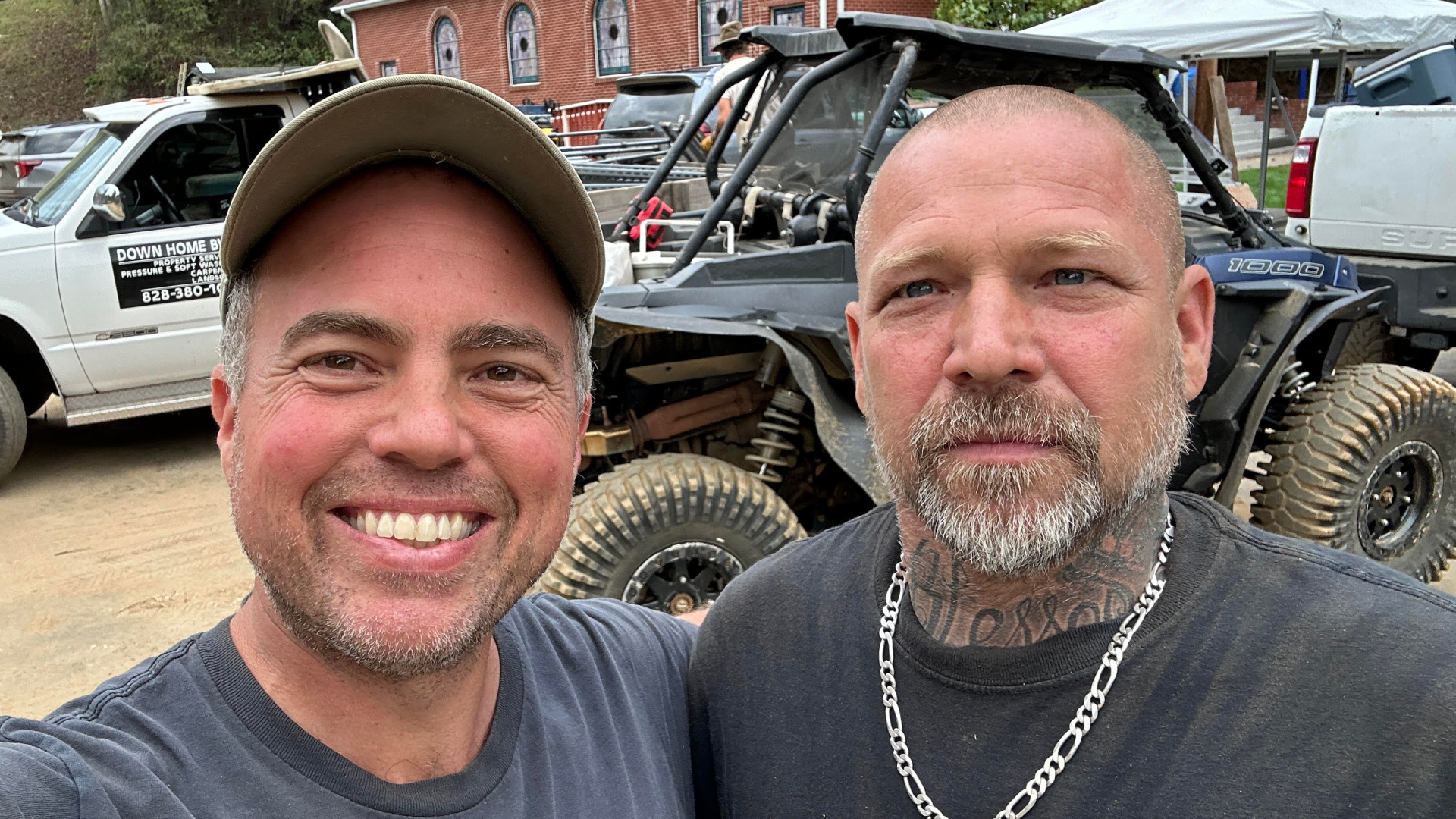
David Grimsley, left, poses with another relief worker, in western North Carolina last week.
David carried much-needed supplies to the Helene-ravaged area and helped distribute them to remote communities in need.
“I went to places where I never thought I would see in the deep hollers of North Carolina. Oftentimes we were the first people to knock on these doors since the storm happened.”
Like many Guilfordians, David Grimsley ’00 read the early headlines coming out of western North Carolina last week and wondered what he could possibly do to help the victims of Hurricane Helene.
“I think a lot of people saw the images and stories and thought the same thing,” says David, a resident of Floyd, a community in southwest Virginia. “How can I help these people?”
Here’s how David helped: He and a friend loaded a Ford F-250 pickup truck with chain saws, water, non perishable food and 100 gallons of fuel and drove into a part of North Carolina many were trying to flee.
For the next six days David navigated around downed power lines, and hiked into remote unincorporated mountain communities to help hundreds of families and individuals left homeless by Helene.
David says many homes built in the woods between mountain ridges and down rural roadways remain inaccessible, even a week after the storm. So by foot, by hoof, by all-terrain vehicles — volunteers like David are getting food, medicine and other supplies to those still stranded by any means necessary.
“I went to places where I never thought I would see in the deep hollers of North Carolina,” says David. “Oftentimes we were the first people to knock on these doors since the storm happened.”
David wasn’t sure how people would react when they saw he and other complete strangers walking in with food and supplies. “People in those areas kind of keep to themselves so I was expecting more of a skeptical eye to strangers just showing up,” he says. “But they were just the opposite. They were so relieved to see other humans.”
David says those smiles will stay with him for years, but so will other memories. “The smells, the scenes. There were a lot of dead people that got washed down rivers that we’ll be finding weeks and months from now,” he says. “There’s just incredible devastation everywhere. I’ve never seen anything like it. In some places it looked like an atomic bomb went off.”
David returned home to Floyd Sunday afternoon after state and federal officials began setting up and coordinating relief efforts. Even from home, he’s still working to help others in western North Carolina.
He’s tracking down empty warehouses around the region to store supplies that have already been offered to the state. He’s worried Hurricane Milton, which is expected to hit the west coast of Florida this week, might divert resources and supplies from North Carolina.
“We have so many people who have given and the supplies are building up, but we can’t find a home for them in the area just yet,” he says. “That’s what I’m working on now.”
Anyone interested in helping with relief efforts can drop off supplies at Alumni Gym on campus. The College is working with Democracy Green, an environmental advocacy group providing meals, water and other supplies to those in need.
David, who majored in Anthropology and Sociology at Guilford, works for The Handmade Music School, a nonprofit in Floyd that teaches old-time bluegrass music to children and records the music and culture of Appalachia. He says he spent the night on campus as a prospective student and “just fell in love with everything – the campus, the teachers, the students.”
“Guilford has a way of changing you and changing you for the better,” he says. “I know that because it changed me.”
He says his work in the mountains last week was an extension of what he learned at Guilford. “Help others, make the world a little better,” he says. “It’s that easy.”

